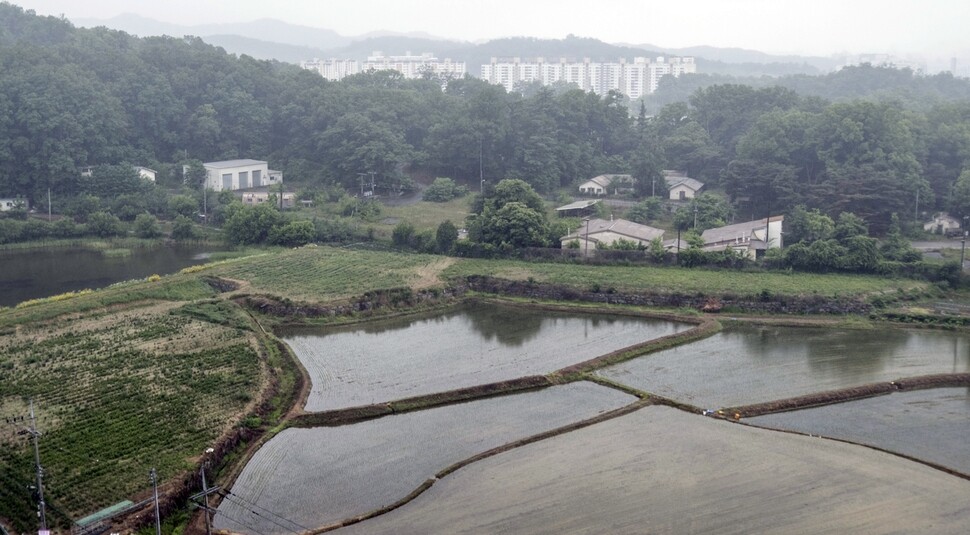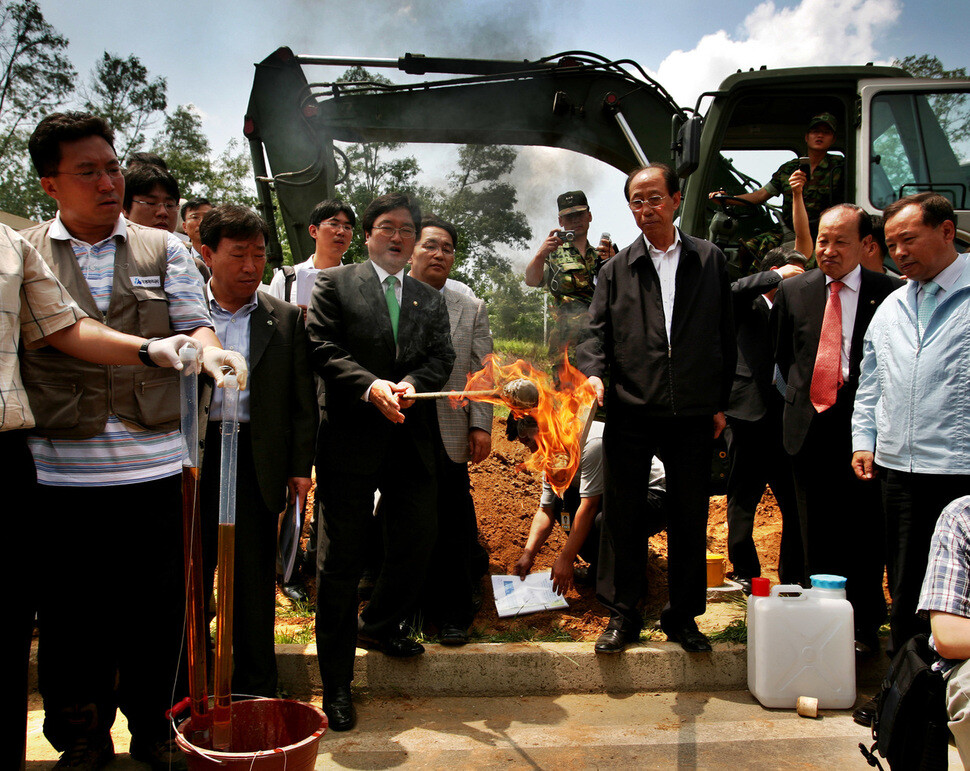hankyoreh
Links to other country sites 다른 나라 사이트 링크
The absurd spectacle of land sitting off-limits to anyone for years at a time

For close to seven years, the 340,000 square meter plot of land in the Taejang neighborhood of Wonju, Gangwon Province, has been visited by no one. South Koreans are barred from access to the site, where only US-employed security guards remain after the US military left following the 2010 closure of Camp Long. When Hankyoreh reporters arrived at Camp Long’s front entrance in June, they were waved off by a South Korean security guard. “This is US military ground,” the guard said. Unable to access the inside of Camp Long, village residents planted sweet potatoes, beans, and peppers along the fence.
The absurd spectacle of broad swaths of South Korean land being held down for years at a time despite not being used by the US military is a repeated occurrence. The Yongsan Relocation Plan (YRP) and Land Partnership Plan (LPP), which serve as a basis for the US military base relocation effort, specify 44 bases (not including training sites) to be returned to South Korean control by 2008, covering a total area of 43,670,000 square meters. To date, only 22 have actually been returned -- 11% of the total area. Camp Long in Wonju is one of the 22 bases that have not yet been returned. Wonju city government completed payment last year on the contracted 66.5 billion won (US$57.8 million) for purchasing of the site from the Ministry of National Defense, but no date has been set for the return.
“We’ve made 69 visits to the Ministry of National Defense, the Ministry of Environment, the Ministry of Foreign Affairs, and the Office for Government Policy Coordination to call for the return, to no avail,” a city government official said.
Kim Ji-yeon, head of the Ministry of Environment‘s land and underground water division and the South Korean chairperson for the South Korean government and US military’s environmental subcommittee ahead of the base handover, explained that the “talks are being delayed because South Korea and the US haven’t bridged their differences on responsibility for remedying Camp Long’s environmental contamination.”

The Ministry of National Defense has predicted the return will happen within the year. But as of July, no schedule had even been set between South Korea and the US for environmental talks for Camp Long. As of July 2017, four former camps are still at the environmental talks stage: Camp Long, Camp Eagle, Camp Market, and Camp Hovey. The only way to achieve a swift base return now would be for the South Korean government to give up on holding the US military responsible for environmental cleanup.
The reason for the repeated absurdities with the environmental talks is a combination of the US military‘s vague environmental cleanup standards (which disregard South Korean environmental law), a procedure that is dictated by US military decisions, and the incompetence of the negotiators on the South Korean side. Since the 1966 signing the Status of Forces Agreement (SOFA) - which includes zero environmental regulations - the two sides have failed to come up with any clear environmental contamination cleanup standards. After revelations in 2000 that the US military had unilaterally discharged formalin into the Han River, a new provision was added in the 2011 SOFA minutes stating that the US “respects the Republic of Korea’s environmental laws and standards.” In addition to stating the US would only “respect” but not necessarily “abide by” the laws and standards, the additional vague standard of “known, imminent, and substantial endangerment (KISE) to human health and safety” was included. In effect, the decision on whether to clean up the environment left to the US military’s own subjective standards rather than domestic environmental ones.
During the latter half of the Roh Moo-hyun administration in 2007, the National Assembly held hearings on environmental remediation efforts for returned USFK bases. As frictions intensified between South Korea and the US over a survey of environmental contamination at Busan’s Camp Hialeah, the environmental talks emerged as one of the thorniest areas of the base return negotiations. The South Korean public’s calls to address environmental contamination on US bases changed rapidly after the Lee Myung-bak administration took office and South Korea and US reached an agreement in 2009 on a joint environmental assessment procedure (JEAP).
A classified US State Department document released by Wikileaks revealed the JEAP agreement has been demanded after Deputy Secretary of State John Negroponte told the South Korean Ministry of Foreign Affairs at a vice minister-level strategic dialogue in Washington on Sep. 2, 2008, that the US military could not be assigned unlimited responsibility for environmental cleanup. In 2009, the South Korean government agreed to JEAP, which limited the environmental survey period for returned US bases to 20-150 days and blocked Seoul from disclosing related information without US military agreement.
Since then, the US military has yet to even once acknowledge responsibility for contamination on its bases or attempt to clean it up. Since the US military has not done any cleanup efforts, the South Korean government has never checked whether the cleanup was properly done.
“Since the US military hasn’t acknowledged responsibility for contamination or taken any measures since 2009, the South Korean government doesn’t have any experience with examining the US military’s measures,” Kim Ji-yeon explained in a telephone interview with the Hankyoreh.
Since JEAP, environmental negotiations on returned bases have had a history of buck-passing. In 2010, Camp Hialeah in Busan was returned without any environmental cleanup by the US military. The government announced the cleanup would cost around 300 million won (US$260,800); 14.3 billion won (US$12.4 million) ended up being spent. After Camp Castle in Dongducheon was returned in Mar. 2015, the South Korean government had to commission a 19.6 billion won (US$17 million) cleanup effort.
South Korean government incompetence has contributed to the buck-passing.
“On the South Korean side, the working-level officials in charge of environmental negotiations for returned US bases are periodically switched out, and because the switching over isn’t handled properly, we end up with much weaker bargaining strength than the US,” said a former senior official with the Ministry of National Defense’s USFK base relocation project team.
The Hankyoreh‘s own investigation confirmed that the position of Ministry of Environment US base return environmental negotiation officer was vacant as of July 2017, while the executive officer was switched out after three months. The head of the land and underground water bureau, which manages all domestic land and underground water issues, is tasked with handling US base environmental talks on their own - a situation that is very likely to continue through the remaining half of the returned base negotiations.
“Even if we amend SOFA’s environmental regulations, that means nothing if our government isn’t determined to enforce the law,” said Pai Chai University civil law professor Kim Dong-geon.
Denied access to the main gate at Camp Long in Wonju, the Hankyoreh’s reporters moved along to a site in back of the base where an oil leak occurred in 2001. A gentle rain began to fall. Sixteen years ago, oil had welled up into a rice paddy under the base‘s wall. Standing under an umbrella looking at the paddy was a farmer is his 70s, who said he had seen it happen.
“The US military is supposed to have come here to protect us. The least they could do is have someone clean up that oil,” he said.
“I’m okay. It wasn’t a big deal,” he insisted.
“But when I went to sell the rice straw, they told us our stuff was so contaminated they couldn’t even give it to the cows for feed. So we brought it back. What can you do?”
By Lim Ji-sun, staff reporter in Wonju
Please direct questions or comments to [english@hani.co.kr]

Editorial・opinion
![[Column] A death blow to Korea’s prosecutor politics [Column] A death blow to Korea’s prosecutor politics](https://flexible.img.hani.co.kr/flexible/normal/500/300/imgdb/original/2024/0415/7517131654952438.jpg) [Column] A death blow to Korea’s prosecutor politics
[Column] A death blow to Korea’s prosecutor politics![[Correspondent’s column] The US and the end of Japanese pacifism [Correspondent’s column] The US and the end of Japanese pacifism](https://flexible.img.hani.co.kr/flexible/normal/500/300/imgdb/original/2024/0412/1017129080945463.jpg) [Correspondent’s column] The US and the end of Japanese pacifism
[Correspondent’s column] The US and the end of Japanese pacifism- [Guest essay] How Korea turned its trainee doctors into monsters
- [Guest essay] As someone who helped forge Seoul-Moscow ties, their status today troubles me
- [Editorial] Koreans sent a loud and clear message to Yoon
- [Column] In Korea’s midterm elections, it’s time for accountability
- [Guest essay] At only 26, I’ve seen 4 wars in my home of Gaza
- [Column] Syngman Rhee’s bloody legacy in Jeju
- [Editorial] Yoon addresses nation, but not problems that plague it
- [Column] Can Yoon and Han stomach humble pie?
Most viewed articles
- 1[Guest essay] How Korea turned its trainee doctors into monsters
- 2[News analysis] Watershed augmentation of US-Japan alliance to put Korea’s diplomacy to the test
- 3[Column] A death blow to Korea’s prosecutor politics
- 4[Photo] Cho Kuk and company march on prosecutors’ office for probe into first lady
- 5[Column] A third war mustn’t be allowed
- 6‘National emergency’: Why Korean voters handed 192 seats to opposition parties
- 7Exchange rate, oil prices, inflation: Can Korea overcome an economic triple whammy?
- 8After Iran’s attack, can the US stop Israel from starting a regional war?
- 9[Editorial] New KBS chief is racing to deliver Yoon a pro-administration network
- 10[Editorial] S. Korea should take a note from US-China tactical compromise